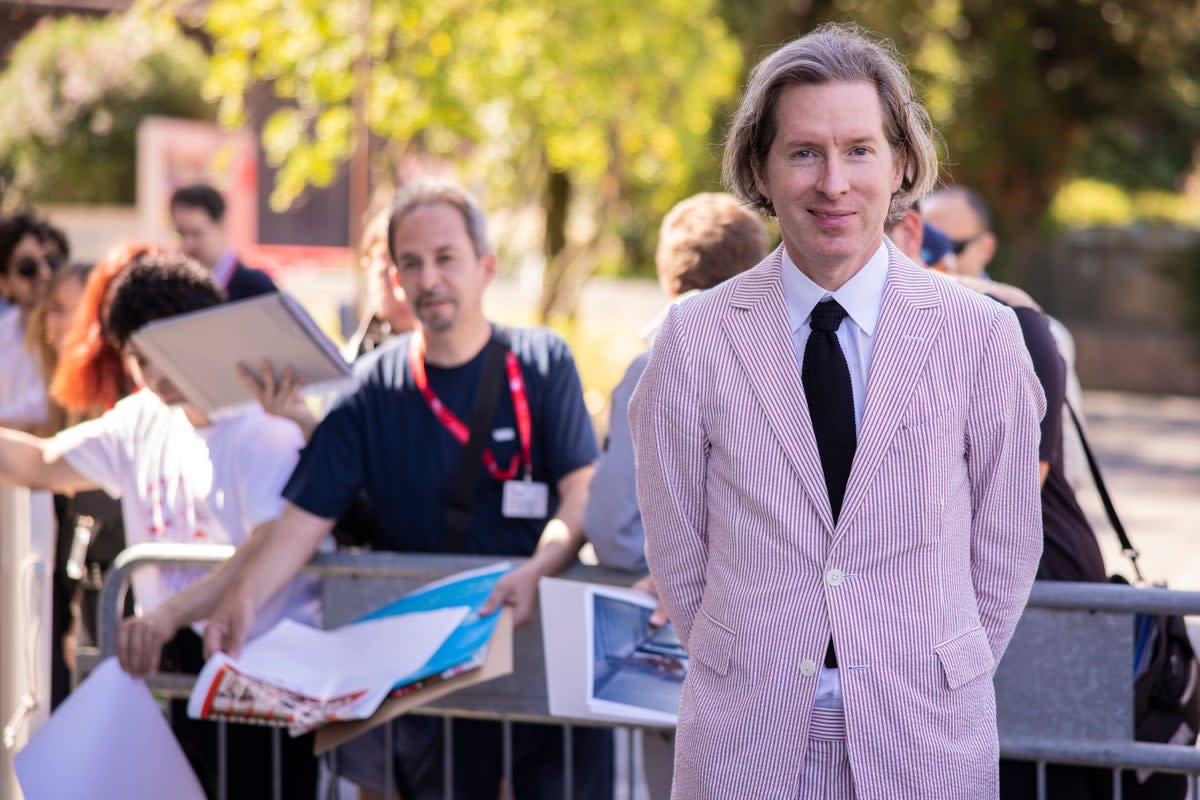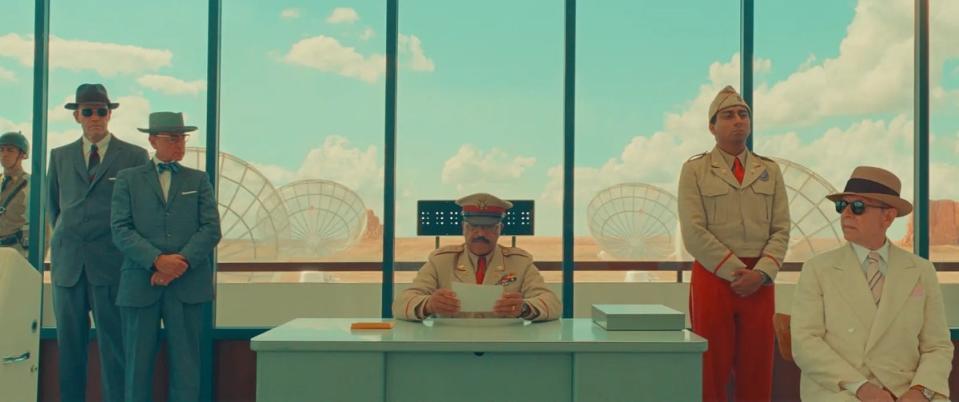OPINION - Wes Anderson is the most overrated and self-satisfied director

Wes Anderson is an exquisite. You might expect the editor of Britain’s sharpest dressed men’s style magazine (incredibly, that’s me) to approve of anyone who fits that arcane descriptor for a dandified male. But there’s something about Anderson’s tweedy, elbow-patched affect that rankles.
For years I thought my antipathy towards the floppy bow-tied film-maker had less to do with the limitations of his movies, than with his fusspot personal style: the whippet-on-hunger-strike physique; the Pardoner’s hair; the bicycle-clipped Seventies librarian vibe that only Anderson’s fellow corduroy salesmodel, Jarvis Cocker, can comfortably pull off, because only Jarvis Cocker implicitly acknowledges the creepiness of a rich and famous middle-aged man cultivating the appearance of a jumble sale Brummel (Cocker is from Yorkshire, so he has history on his side; Anderson is from Texas where, unless I’m much mistaken, coming on like a seedy Alan Bennett impersonator has less clearly delineated provenance).
But lately, rewatching Anderson’s old films and then sighing and fidgeting through Asteroid City, which was released over the summer and happens to feature Jarvis Cocker (The Wonderful Story of Henry Sugar comes to Netflix tomorrow), I realised that, rather than the attention-seeking wardrobe, it’s the movies that reveal Anderson for what he is.
Not the delightfully eccentric visionary of popular acclaim, but a pale facsimile of a great writer-director — a fauxteur. Like a charity shop rail of soiled gent’s blazers, something about Anderson’s oeuvre just doesn’t smell right. It’s the naphthalene reek of recycled material, second-hand ideas and worn-out aesthetic choices.
Anderson’s early films — Bottle Rocket (1996), Rushmore (1998) — felt fresh and funny. Here was a new voice with a distinctive sensibility. A bit whimsical and pleased with itself for some (me), but invigorating. What we didn’t know then was that his best work was already behind him.
The Royal Tenenbaums, released in 2001, is still perhaps his most beloved movie. It has all the tropes that would calcify into tics: a stellar ensemble playing elaborately costumed, two-dimensional oddballs; meticulous, doll’s house production design; and a confected mournfulness, superficially deep, deeply superficial.

We are presented with a family of failed prodigies apparently mired in grief, depression, and dysfunction — but every effort is made to reassure us that this is all a mere fancy. Anderson’s characters exist only inside the screen. There is no suggestion that these immaculate mannequins could ever live in the real world, breathing the same unfiltered air as the rest of us — imperfectly as we dress, disappointingly conventional as our humdrum interior décor must appear to a connoisseur of Anderson’s otherworldly discernment.
It might seem a bit much to accuse a film director of inauthenticity. They are in the business of make-believe. But The Royal Tenenbaums is so sterile as to seem inhuman. All the grit and grain, the viscera of real life, has been surgically removed. Consequently nothing is at stake. Suicide is played for laughs. Incest is played for laughs. Racism is played for laughs. It’s tragicomedy without the tragedy. And sometimes without the comedy.
One wondered what Anderson might do next? The answer was more of the same, with baggier scripts, even more bloated casts, and diminishing returns. The Life Aquatic with Steve Zissou (2004) is a film so soaked in self-regard that not even Bill Murray, doing his familiar enigmatic deadpan, could rescue it from drowning.
The Darjeeling Limited (2007) is an Orientalist folly, with a trio of glib performances from Anderson regulars Owen Wilson, Jason Schwartzman and Adrien Brody. The stop-motion animation employed to adapt Roald Dahl’s Fantastic Mr Fox (2009) is cute, for sure, but Moonrise Kingdom (2014) is muddled, mannered, and enervating.
In that film a pair of precocious preteens go missing in a remote island wilderness. Is there ever any sense of real jeopardy? There is not. The film that followed it, the madcap The Grand Budapest Hotel (2014) was distinguished by a livewire central performance from Ralph Fiennes, but still betrayed its source material, the writings of the Viennese master Stefan Zweig, replacing the Nazis with comedy quasi-fascists who offer no palpable threat. It’s the end of civilisation as trivial jeu d’esprit.
Worse was to come: following another stop-motion palate-cleanser, Isle of Dogs (2018), The French Dispatch (2021) was a fanboy’s love letter to old-timey American magazines, specifically the New Yorker. Even that illustrious organ could muster only the faintest enthusiasm.

As to the recent Asteroid City, it has all of his tiresome late tendencies and little of his early effervescence. There is a maddening framing device — we are watching a film inside a play inside a film (I think that’s accurate, it was hard to tell and harder to care) — in which a bunch of junior physicists and their parents gather in the desert of the American southwest — Monument Valley reconstituted in what looks like Play-Doh — where they encounter a B-movie alien who resembles Morph with a case of the measles.
As ever, a remarkable cast has been assembled, and given precious little to do. Steve Carrell is less a motel manager than a sun visor and a pencil moustache. Tom Hanks — Tom Hanks! — is reduced to a pistol stuffed into the waistband of a pair of Slim Aarons slacks (it never goes off).
Actors as distinguished as Willem Dafoe, Bryan Cranston and Jeffrey Wright are so underused you wonder why they signed up. Margot Robbie has one scene. Jeff Goldblum has one line. As in the past (Gene Hackman in Tenenbaums; Fiennes in The Grand Budapest Hotel; George Clooney as Mr Fox), a solitary star proves so charismatic that even the cardboard characterisation can’t prevent them burning a hole in the screen — in this case the electrifying Scarlett Johansson, playing a Hitchcockian movie star (not for the first time).
As for the rest of them — Schwartzman, Brody, Tilda Swinton, Edward Norton, et al — never has that disobliging dismissal of actors as “moving scenery” seemed more apt.
Like those handmade wooden toys that progressive parents force on their offspring when the poor mites would much prefer the mass-produced plastic tat ostensibly less privileged kids get to enjoy (Barbie?), there’s a sense that Anderson’s films, homespun and wholesome as they seem, have been approved as fit for consumption by our elders and betters, who frown upon our baffling preference for films not so finely crafted to appeal to superannuated hipsters (Barbie again?).
It’s those same hipsters who recently spearheaded the lamentable internet phenomenon known as Accidentally Wes Anderson, which began with AI-generated pastiches of Anderson’s style — The Galactic Menagerie: A Star Wars Story — and developed into a TikTok trend in which people photographed themselves in colour-coordinated tracksuits, standing disconsolately in front of pastel-painted facades. As if the best parodies of Anderson’s films were not, already, Anderson’s films.

What could be worse than Accidentally Wes Anderson? How about Deliberately Wes Anderson? You can see this phenomenon everywhere today, from interiors magazine spreads to shop window displays: arch recreations of Andersonian mise en scenes.
“Wes Anderson has a lot to answer for,” muttered a friend of mine the other lunchtime, as we took in the scene at the new Manzi’s fish restaurant, in Soho, from our turquoise banquette: Verdigris mermaids, a taxidermied marlin, an alabaster Poseidon.
At 54, then, Anderson is cinema’s perpetual adolescent. Is there a hope that he might one day use his undeniable talent and technique to create a film that explores, or even acknowledges, the messiness, and the glory, of adult lives? Does he harbour that secret ambition? Or is he content to keep building counterfeit neverlands, comforting in their order, and as compelling as the wallpaper he so painstakingly selects to decorate them?
Let’s hope not. Otherwise his legacy will be not much more than online memes, overdesigned hotel rooms, derivative fashion shoots and the sense that a once promising filmmaker long ago disappeared up his own, no doubt beautifully kempt, fundament.
Alex Bilmes is editor in chief of Esquire. Wes Anderson’s The Wonderful Story of Henry Sugar is released on Netflix on September 27

 Yahoo Movies
Yahoo Movies 
